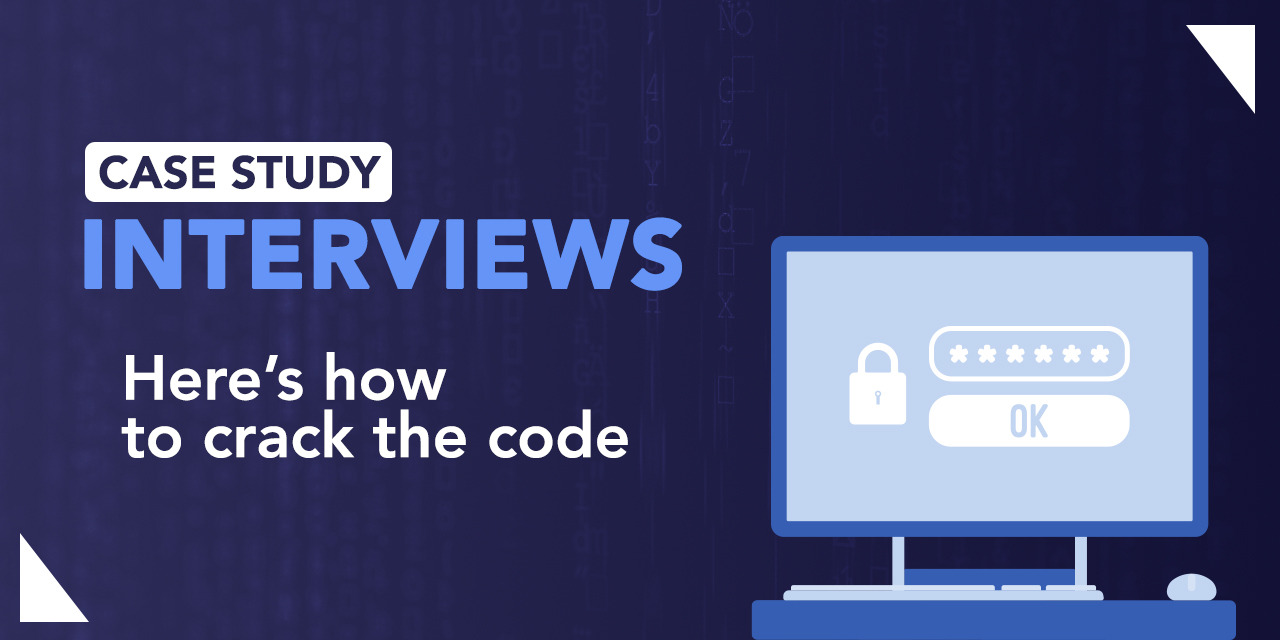Typically a part of consulting, business and finance roles, case study interviews are used by employers to assess a candidate’s analytical, reasoning and communication skills. A basic understanding of key business concepts e.g. revenue, fixed and variable costs, profit, market share, customers, competitors and stakeholders is also tested.
What is a case study interview?
A case study interview is a job interview that puts the candidate in the driver’s seat by giving them a real-business problem to work through and solve. While case study interviews are commonly used for management consulting roles, they can be used in other industries as well.
Case study interviews are among the most difficult job interviews, assessing candidates on their analytical reasoning, problem solving skills, ability to work under pressure as well as attention to detail. As much as reaching an effective solution is important, the logical reasoning you use to address the challenges and solve the case is equally important.
Types of Case Study Interviews
You may need to pass various types of case study interviews depending upon the employer and the role before you land a coveted job offer. Some common ones include:
Real or theoretical business scenarios: In this type of cases, you may be given some basic numerical or statistical data. For instance, “Vyne is a startup that wishes to work on its online branding. What needs to be done to maximize its brand awareness?”
Lateral thinking scenarios: “What creative suggestions and methods can you suggest to further increase easy access to education for underprivileged kids?”
Numeracy scenarios asking you to estimate figures: ‘Should a North-American-based laundry detergent company launch their product into the European or Latin American market to find an incremental $20 million in revenue?’
Analyzing graphs and charts to show your understanding of the information into the overall context of the case. Moreover, these types of pictorial information also evaluate how you interpret and present business insights.
How to prepare for a case study interview?
If you have reached the interview stage, here are some tips to help you prepare for a case study interview:
1. Do some research on the format of case study interviews
2. See what a company is looking for in their ideal candidate
3. Review sample questions
4. Practice. Practice. Practice.
• Do some research on the format of case study interviews:
Case study interviews typically tend to have similar formats across the consultancies where they are used. The interviewee is given a hypothetical business situation and asked to present a solution to the interviewer after reviewing the necessary materials.
In some cases, other elements may be added to the interview, such as slideshow presentations, where the candidate may be asked to gather important insights and then present them. So, make sure you’re prepared for all kinds of potential scenarios by thoroughly researching the company beforehand.
• See what a company is looking for in their ideal candidate:
In a competitive job market, you’ll have to compete with others who are equally qualified as you. Your resume and cover letter can only get you so far. In case study interviews, you have to demonstrate strong soft skills to stand apart from other applicants.
Here are some skills employers commonly look for during a case study interview:
- Culture fit
- Dependability
- Curiosity
- Adaptability
- Emotional intelligence
- Clear communication
- Problem-solving
- Leadership and initiative
• Review sample questions:
It’s recommended to hunt for case interview sample questions beforehand and use them to prepare yourself. Understanding what sort of questions to expect in the interview and acquainting yourself with them will help your prioritize the most important elements asked in an interview.
• Practice, practice, practice:
Practice is a vital way of improving your interviewing skills and preparing you for different scenarios. Consulting firms offer online tools, work samples and previous case studies of how they’ve assisted their clients. Some may document their relationships with their clients, which can help you demonstrate how you should interact in a given scenario.
Additionally, conduct a mock interview with a friend or family member to help you build your confidence in crafting the correct response to the question an interviewer asks you. This provides you with the opportunity to practice active listening and clarify how you should answer a particular question.
Tips for handling case study interviews
- Visit the web pages of any of the major management consulting firms and look for the section on careers and interview preparation for good tips. Practice talking through the cases as you would in the interview room.
- Listen carefully to what the interviewer says, take notes and refer to them if necessary to summarize the scenario, analysis and solution.
- Make use of any resources in the room, such as a whiteboard, pens and paper.
- Use visual aids to document and demonstrate your structure or response. Depending on the question, you could use organizational charts, pie charts, timelines, graphs, flow charts or any other project management methodology.
- Be realistic. The interviewer is looking for real-world solutions to the problem so be wary of proposing unrealistic budgets, risky endeavors or other solutions that would be excessively difficult to implement.
- Showcase your communication and interpersonal skills. Treat the interviewer as you would treat a client in the workplace. Use positive body language and try to explain your reasoning clearly.
- Ensure your conclusions flow logically from the steps you have taken throughout the interview.
